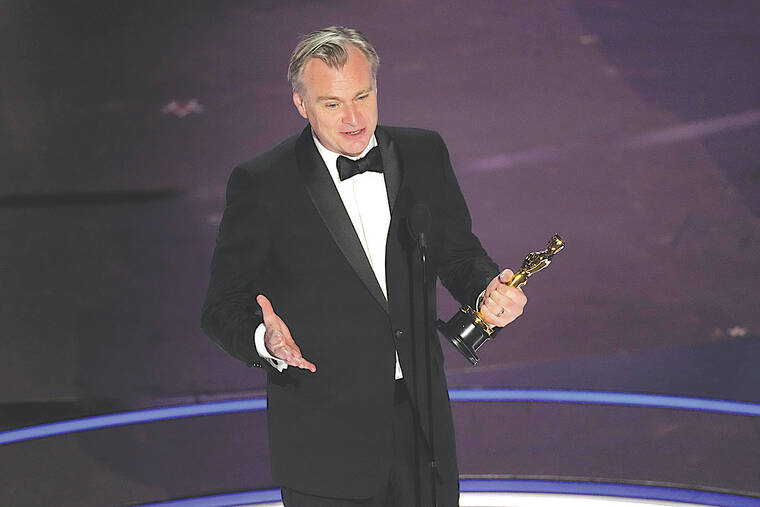‘Oppenheimer’ crowned best picture at an Academy Awards shadowed by war
LOS ANGELES — “Oppenheimer,” a solemn three-hour biopic that became an unlikely billion-dollar box-office sensation, was crowned best picture at a 96th Academy Awards that doubled as a coronation for Christopher Nolan.
After passing over arguably Hollywood’s foremost big-screen auteur for years, the Oscars made up for lost time by heaping seven awards on Nolan’s blockbuster biopic, including best actor for Cillian Murphy, best supporting actor for Robert Downey Jr. and best director for Nolan.
In anointing “Oppenheimer,” the Academy of Motion Pictures Arts and Sciences did something it hasn’t done for more than a decade: hand its top prize to a widely seen, big-budget studio film. In a film industry where a cape, dinosaur or Tom Cruise has often been a requirement for such box office, “Oppenheimer” brought droves of moviegoers to theaters with a complex, fission-filled drama about J. Robert Oppenheimer and the creation of the atomic bomb.
“For better or worse, we’re all living in Oppenheimer’s world,” said Murphy in his acceptance speech. “I’d like to dedicate this to the peacemakers.”
As a film heavy with unease for human capacity for mass destruction, “Oppenheimer” also emerged — even over its partner in cultural phenomenon, “Barbie” – as a fittingly foreboding film for times rife with cataclysm, man-made or not.
Sunday’s Oscars at the Dolby Theatre in Los Angeles unfolded against the backdrop of wars in Gaza and Ukraine, and with a potentially momentous U.S. election on the horizon.
Awards for the documentary winner, “20 Days in Mariupol,” and best international film, “The Zone of Interest,” brought geopolitics into the Oscar spotlight.
The most closely watched contest went to Emma Stone, who won best best actress for her performance as Bella Baxter in “Poor Things.” In what was seen as the night’s most nail-biting category, Stone won over Lily Gladstone of “Killers of the Flower Moon.” Gladstone would have become the first Native American to win an Academy Award.
Instead, Oscar voters couldn’t resist the full-bodied extremes of Stone’s “Poor Things” performance. The win for Stone, her second best actress Oscar following her 2017 win for “La La Land,” confirmed the 35-year-old as arguably the preeminent big-screen actress of her generation.
The list of women to win best actress two or more times is illustrious, including Katharine Hepburn, Frances McDormand, Ingrid Bergman and Bette Davis.
“Oh, boy, this is really overwhelming,” said Stone, who fought back tears and a broken dress during her speech.
Sunday’s broadcast had razzle dazzle, including a sprawling song-and-dance rendition of the “Barbie” hit “I’m Just Ken” by Ryan Gosling, with an assist on guitar by Slash and a sea of Kens who swarmed the stage.
But protest and politics intruded on an election-year Academy Awards. Late during the show, host Jimmy Kimmel read a critical social media post from former president Donald Trump.
“Thank you for watching,” said Kimmel. “Isn’t it past your jail time?”
Nolan has had many movies in the Oscar mix before, including “Inception,” “Dunkirk” and “The Dark Knight.”
But his win Sunday for direction is the first Academy Award for the 53-year-old filmmaker. Addressing the crowd, Nolan noted cinema is just over a hundred years old.
“Imagine being there 100 years into painting or theater,” said Nolan, who shared the best-picture award with Emma Thomas, his wife and producer. “We don’t know where this incredible journey is going from here. But to know that you think that I’m a meaningful part of it means the world to me.”
Downey, nominated twice before (for “Chaplin” and “Tropic Thunder”), also notched his first Oscar, crowning the illustrious second act of his up-and-down career.
“I’d like to thank my terrible childhood and the academy, in that order,” said Downey, the son of filmmaker Robert Downey Sr.
“Barbie,” last year’s biggest box-office hit with more than $1.4 billion in ticket sales, ultimately won just one award: best song (sorry, Ken) for Billie Eilish and Finneas’ “What Was I Made For?” It’s their second Oscar, two years after winning for their James Bond theme, “No Time to Die.”


